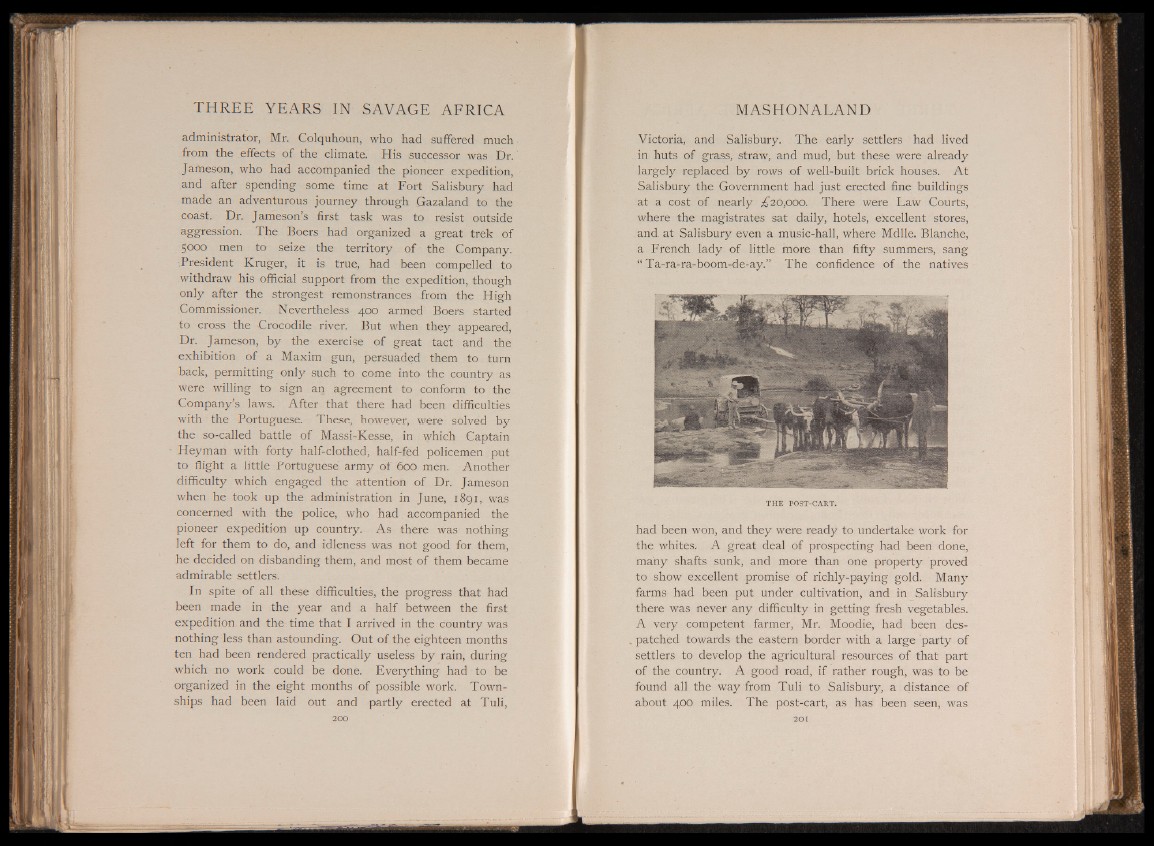
administrator, Mr. Colquhoun, who had suffered much
from the effects of the climate. His successor was Dr.
Jameson, who had accompanied the pioneer expedition,
and after spending some time at Fort Salisbury had
made an adventurous journey through Gazaland to the
coast. Dr. Jameson’s first task was to resist outside
aggression. The Boers had organized a great trek of
5000 men to seize the territory of the Company.
President Kruger, it is true, had been compelled to
withdraw his official support from the expedition, though
only after the strongest remonstrances from the High
Commissioner. Nevertheless 400 armed Boers started
to cross the Crocodile river. But when they appeared,
Dr. Jameson, by the exercise of great tact and the
exhibition of a Maxim guñ, persuaded them to turn
back, permitting only such to come into the country as
were willing to sign an agreement to conform to the
Company’s laws. After that there had been difficulties
with the Portuguese. These, however, were solved by
the so-called battle of Massi-Kesse, in which Captain
Heyman with forty half-clothed, half-fed policemen put
to flight a little Portuguese army of 600 men. Another
difficulty which engaged the attention of Dr. Jameson
when he took up the administration in June, 1891, was
concerned with the police, who had accompanied the
pioneer expedition up country. As there was nothing
left for them to do, and idleness was not good for them,
he decided on disbanding them, and most of them became
admirable settlers.
In spite of all these difficulties, the progress that had
been made in the year and a half between the first
expedition and the time that I arrived in the country was
nothing less than astounding. Out of the eighteen months
ten had been rendered practically useless by rain, during
which no work could be done. Everything had to be
organized in the eight months of possible work. Townships
had been laid out and partly erected at Tuli,
200
Victoria, and Salisbury. The early settlers had lived
in huts of grass, straw, and mud, but these were already
largely replaced by rows of well-built brick houses. At
Salisbury the Government had just erected fine buildings
at a cost of nearly £20,000. There were Law Courts,
where the magistrates sat daily, hotels, excellent stores,
and. at Salisbury even a music-hall, where Mdlle. Blanche,
a French lady of little more than fifty summers, sang
“ Ta-ra-ra-boom-de-ay.” The confidence of the natives
THE POST-CART.
had been won, and they were ready to undertake work for
the whites. A great deal of prospecting had been done,
many shafts sunk, and more than one property proved
to show excellent promise of richly-paying gold. Many
farms had been put under cultivation, and in Salisbury
there was never any difficulty in getting fresh vegetables.
A very competent farmer, Mr. Moodie, had been despatched
towards the eastern border with a large party of
settlers to develop the agricultural resources of that part
of the country. A good road, if rather rough, was to be
found all the way from Tuli to Salisbury, a distance of
about 400 miles. The post-cart, as has been seen, was
201